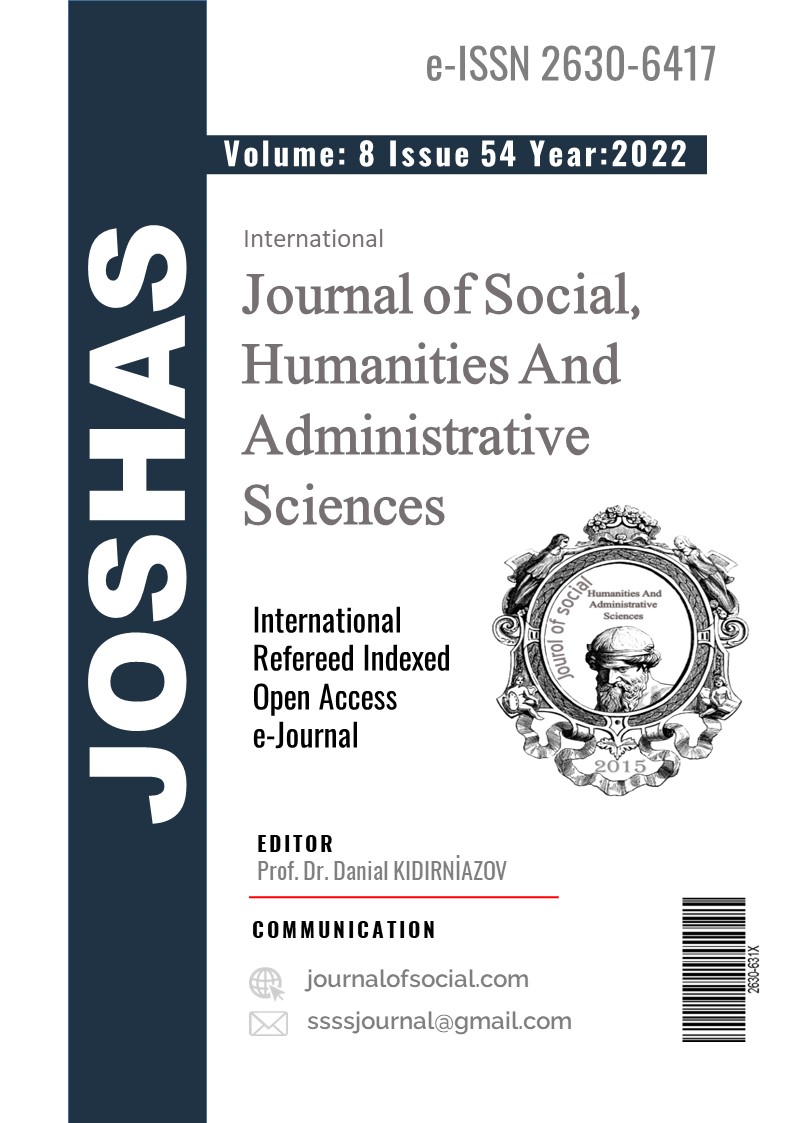Author :
Abstract
Bu araştırmada, altıncı sınıf öğrencilerinin “Küresel Isınma” kavramına yönelik sahip oldukları metaforları belirlenmiştir. Araştırma 2019-2020 eğitim-öğretim yılında Sivas ilinde bulunan 500 öğrenci ile yürütülmüştür. Araştırma verileri yarı-yapılandırılmış anket formu yoluyla elde edilmiştir. Açık uçlu anket sorusu ‘‘Küresel Isınma …………ya benzer/gibidir. Çünkü …………’’ şeklindedir. Toplanan verilerin analiz edilmesi ve yorumlanmasında içerik analizi yöntemi kullanılmıştır. Araştırmadan elde edilen bulgulara göre; öğrenciler küresel ısınma kavramı için 84 metafor üretmişlerdir. Bu kavramlar içinde üretilen metaforların yüzde olarak en fazla olan metaforların buzulların erimesi, güneş ve sıcak olduğu tespit edilmiştir. Bulgurların önceki çalışmalar ile örtüştüğü belirlenmiştir.
Keywords
Abstract
In this study, the metaphors of the sixth grade students towards the concept of "Global Warming" were determined. The research was carried out with 500 students in Sivas province in the 2019-2020 academic year. Research data was obtained through a semi-structured questionnaire form. Open ended questionnaire question is similar to / like 'Global Warming …………'. Because ………… ”. Content analysis method was used to analyze and interpret the collected data. According to the findings obtained from the research; students produced 84 metaphors for the concept of global warming. The metaphors, which are the highest percentage of metaphors produced in these concepts, were found to be melting of glaciers, sun and hot. It is determined that the bulgur coincides with the previous studies.
Keywords
- 1. Akın, G. (2006) “Küresel Isınma, Nedenleri ve Sonuçları”, Ankara Üniversitesi Dil ve Tarih-Coğrafya Fakültesi Dergisi, 46 (2), 29-43.
- 2. Aksan, Z. (2011) “İlköğretim öğretmen adaylarının küresel ısınma konusundaki algıları ve görüşleri”, Yüksek Lisans Tezi, Eskişehir Osmangazi Üniversitesi, Sosyal Bilimler Enstitüsü.
- 3. Arslan, A. (2016). Fen Bilgisi Öğretmen Adaylarının Küresel Isınma Kavramına İlişkin Algılarının Metafor Analizi Yoluyla İncelenmesi, International Journal Of Social Science Doi Number:Http://Dx.Doi.Org/10.9761/Jasss3343 Number: 44 P. 453-466.
- 4. Arslan, M. M. ve Bayrakçı M. (2006) “Metaforik Düşünme ve Öğrenme Yaklaşımının Eğitim-Öğretim Açısından İncelenmesi”, Milli Eğitim Yayınları. 171 (Yaz), 100-108.
- 5. Ambusaidi, A., Boyes, E., Stanisstreet, M. ve Taylor, N. (2012) “Omani students' views about global warming: beliefs about actions and willingness to act”, International Research in Geographical and Environmental Education, 21-39.
- 6. Ateş, M. ve Karatepe, A. (2013) ‘‘Üniversite Öğrencilerinin “Küresel Isınma” Kavramına İlişkin Algılarının Metaforlar Yardımıyla Analizi’’, Marmara Coğrafya Dergisi, 27 (1), 221-241.
- 7. Ayas, A.ve. Çepni S.(Ed.) (2012) Fen ve Teknoloji Öğretimi (10. Baskı). Ankara: Pegem Yayıncılık.
- 8. Aydın, F. (2014) “Ortaöğretim öğrencilerinin küresel ısınma konusundaki bilgi düzeylerinin belirlenmesi’’, Turkish Journal of Education, 3 (4), 15-27.
- 9. Balcı A. (1999) “Okul ile İlgili Mecazlar(Metafor): Seçilmiş Dört Okulda Öğrencilerin, Öğretmenlerin ve Velilerin Okul Algıları”, Doktora Tezi, Ankara Üniversitesi, Eğitim Bilimleri Bölümü.
- 10. Boyes, E. ve Stanisstreet, M. (1997) “Children's models of understanding of two major global environmental ıssues ozone layer and greenhouse effect”, Research in Science and Technological Education, 19-29.
- 11. Bozoğlu, B., Keskin, B. ve Çavdar S. (2003) “Küresel Isınma”. 6. Çevre Sorunları Öğrenci Yaklaşımları Sempozyumu, Nisan 2003. Mersin.
- 12. Büyüköztürk, Ş., Kılıç Çakmak, E., Akgün, Ö.E., Karadeniz, Ş. ve Demirel, F. (2008) “Bilimsel araştırma yöntemleri”, Pegem Yayınlar, (14. Baskı). Ankara.
- 13. Cohen, L., and Manion, L. (1994) “Research Methodsin Education (4th ed.) ”, London: Routledge.
- 14. Creswell, J. W., ve Creswell, J. D. (2017). Research design: Qualitative, quantitative, and mixed methods approaches. Sage publications.
- 15. Eroğlu, B. (2009). “Fen Bilgisi Öğretmen Adaylarının Küresel Isınma Hakkındaki Bilgi Düzeylerinin Belirlenmesi”, Yüksek Lisans Tezi, Gazi Üniversitesi, Eğitim Bilimleri Enstitüsü, Ankara.
- 16. Guerrero, M.C.M. ve Villamil, O.S. (2002). Metaphorical conceptualizations of ESL teaching and learning. Language Teaching Research, 6 (2), 95-120.
- 17. Hogler, R., Gross, M.A., Hartman, J.L. ve Cunliffe, A.L. (2008). Meaning in organizational communication: Why metaphor is the cake, not the icing. Management Communication Quarterly, 21, 393-412.
- 18. Kılınç, A., Stanisstreet, M. ve Boyes, E. (2008) “Turkish students’ ıdeas about global warming, International ”, Journal of Environmental and Science Education, 3, 2, 89-98.
- 19. Miller, S. (1987). Some comments on the utility of metaphors for educational theory and practice. Educational Theory, 37, 219-227.
- 20. Öztürk, K. (2003). “Küresel iklim değişikliği ve Türkiye’ye olası etkileri”, Gazi Üniversitesi Gazi Eğitim Fakültesi Dergisi, 22(1). 47-65.
- 21. Rye, J. A., Rubba, P. A. ve Wiesenmayer, R. L. (1997) “An İnvestigation of middle school students' alternative conceotions of global warming”, International Journal of Science Education, 527-551.
- 22. Saban, A. (2004) “Giriş Düzeyindeki Sınıf Öğretmenleri Adaylarının ‘Öğretmen’ Kavramına İlişkin İleri Sürdükleri Metaforlar”, Türk Eğitim Bilimleri Dergisi. 2(2), 131-155.
- 23. Schreiner, C., Henriksen, E., K. ve Hansen, P. J. K. (2005) Climate education: Empowering today's youth to meet tomorrow's challenges. Studies In Science Education. 41 (1), 3-50.
- 24. Sezgin, F., Koşar, D., Koşar, S., ve Er, E. (2016) ‘‘Öğretmenlerin Öğrenciye Yönelik Metaforlarının Belirlenmesine İlişkin Nitel Bir Araştırma”, Hacettepe Üniversitesi Eğitim Fakültesi Dergisi. S.44. Ankara.
- 25. Shaw, D.M. ve Mahlios, M. (2011). Literacy Metaphors of Pre-Service Teachers: Do They Change After Instruction? Which Metaphors are Stable? How Do They Connect to Theories? Journal of Education for Teaching, 37(1), 77- 92.
- 26. Steger, T. (2007). The stories metaphors tell: Metaphors as a tool to decipher tacit aspects in narratives. Field Methods, 19 (3), 1-22.
- 27. Şenel, H., ve Güngör, B. (2009). Üniversite öğrencilerinin küresel ısınma hakkındaki bilgilerinin ve kavram yanılgılarının tespiti. E-Journal of New World Sciences Academy, 4(4), 1207-1225.
- 28. Tsoukas, H. (1991). The missing link: A transformational view of metaphors in organizational science. The Academy of Management Review, 16(3), 566- 585.
- 29. Yıldırım, A. ve Şimşek, H. (2021) ‘‘Sosyal bilimlerde nitel araştırma yöntemleri’’, Ankara: Seçkin Yayıncılık.





